省略句+练习
- 格式:doc
- 大小:83.50 KB
- 文档页数:30
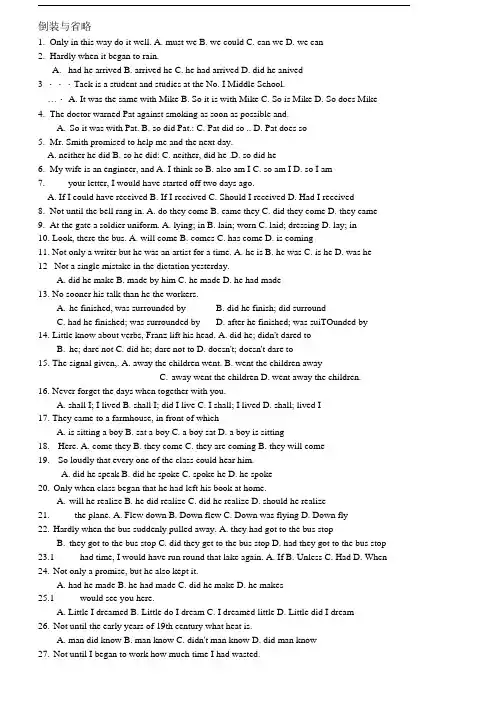
倒装与省略1.Only in this way do it well. A. must we B. we could C. can we D. we can2.Hardly when it began to rain.A.had he arrivedB. arrived heC. he had arrivedD. did he anived3-・・・Tack is a student and studies at the No. I Middle School.…・ A. It was the same with Mike B. So it is with Mike C. So is Mike D. So does Mike4.The doctor warned Pat against smoking as soon as possible and.A.So it was with Pat.B. so did Pat.:C. Pat did so ..D. Pat does so5.Mr. Smith promised to help me and the next day.A. neither he didB. so he did:C. neither, did he .D. so did he6.My wife is an engineer, and A. I think so B. also am I C. so am I D. so I am7.your letter, I would have started off two days ago.A. If I could have receivedB. If I receivedC. Should I receivedD. Had I received8.Not until the bell rang in. A. do they come B. came they C. did they come D. they came9.At the gate a soldier uniform. A. lying; in B. lain; worn C. laid; dressing D. lay; in10.Look, there the bus. A. will come B. comes C. has come D. is coming11.Not only a writer but he was an artist for a time. A. he is B. he was C. is he D. was he12_ Not a single mistake in the dictation yesterday.A. did he makeB. made by himC. he madeD. he had made13.No sooner his talk than he the workers.A.he finished, was surrounded byB. did he finish; did surroundC. had he finished; was surrounded byD. after he finished; was suiTOunded by14.Little know about verbs, Franz lift his head. A. did he; didn't dared toB.he; dare notC. did he; dare not toD. doesn't; doesn't dare to15.The signal given,. A. away the children went. B. went the children awayC.away went the childrenD. went away the children.16.Never forget the days when together with you.A. shall I; I livedB. shall I; did I liveC. I shall; I livedD. shall; lived I17.They came to a farmhouse, in front of whichA. is sitting a boyB. sat a boyC. a boy satD. a boy is sitting18.Here. A. come they B. they come C. they are coming B. they will come19.So loudly that every one of the class could hear him.A. did he speakB. did he spokeC. spoke heD. he spoke20.Only when class began that he had left his book at home.A.will he realizeB. he did realizeC. did he realizeD. should he realize21.the plane. A. Flew down B. Down flew C. Down was flying D. Down fly22.Hardly when the bus suddenly pulled away. A. they had got to the bus stopB.they got to the bus stopC. did they get to the bus stopD. had they got to the bus stop23.1had time, I would have run round that lake again. A. If B. Unless C. Had D. When24.Not only a promise, but he also kept it.A. had he madeB. he had madeC. did he makeD. he makes25.1would see you here.A. Little I dreamedB. Little do I dreamC. I dreamed littleD. Little did I dream26.Not until the early years of 19th century what heat is.A. man did knowB. man knowC. didn't man knowD. did man know27.Not until I began to work how much time I had wasted.A. didn't I realizeB. did I realizeC. I didn't realizeD. I realize28.” Do you know Tom lost his bike again?M "1 don't know."A. nor do I careB. nor don't I careC. I don't care neitherD. 1 don't care also29.Not until all the fish died in the river how serious the pollution was.A: did the villagers realize B. the villagers realizedC.the villagers did realizeD. didn f t the villagers realize30.mother will wait for him for dinner together.A: However late is he B: however he is late , C. However late he is . D. However is he late31.H What's the matter with John?'1 "He didn't pass the test but he stillA. hopes soB. hopes toC. hopes itD. hopes that32."She must look like a very pretty girl." "Yes, I imagine"• A. to B. that C. it D. so33."Will you go home this evening?0 "No, I'm going to a lecture, or at least 1 am planningA. soB. toC. itD. that34."Is Prof Tate very sick?" 'Tm afraid. A. so B. this C. to D. that35.-Do you think it's going to rain over the weekend?——・ A. I don't believe B・ I don't believe it C. I believe not so D. I believe not36.Never in my life or seen such a thing.A. I have heard ofB. I had heard ofC. have I heard ofD. did I hear of37.Seldom TV during the day.A: they watch B. are they watching C. do they watch D. have they watched38.nor read English.A. Can't he either writeB. He can neither writeC. Can he neither writeD. Neither he can write39.Only when thousands of flowers bloom togetherA. spring will be considered here B: could spring be considered hereC. can spring be considered hereD. spring can be considered here40 his appearance that no one could recognize him.A. So was strangeB. Was so strangeC. So strange wasD. Strange so was41.and caught the :house.A. Up the cat jumpedB. The cat up jumpedC. Up jumped the catD. Jumped up the cat42." It was cold yesterday/* 1,1 f Which of the following is wrong?A. So it wasB. So is it todayC. So was it the day before D, So it did43.and the lesson began.A. In came Mr BrownB. Mr Brown in cameC. In came heD. Came in Mr Brown44.On the wall two large portraits. A. hangs B. hang C. hanged D. are hanging45., she was very brave.A. Girl as she wasB. As she was a girlC. A girl as she wasD. Girl as was she46.Little that she was seriously ill herselfA. Susan knewB. did Susan knowC. knew SusanD. was Susan know47.Such the results of the experiments. A. is B. was C. are D. as be48.1didn't read the notice,.A. so did heB. neither didn't heC. nor did heD. he didn't too49.1would have phoned you.A. If I knew itB. Had I known itC. If I know itD. Did I know it5(). " They have done a good job." "”A. So they have doneB. So they haveC. So have theyD. So it is51.Now your turn to read it. A. there is B. has come C. comes D. will come52.No sooner onto the bus than it started moving.A.l had gotB. had I gotC. I gotD. did I get53.Situated in the center.A. is the Bell tower.B. the Bell tower isC. has the Bell TowerD. the Bell tower lies54.Seated at the back of the roomA. some parentsB. are some parentsC. is some parentsD. has some parents55.We came to the police station, at the gate of which with guns .A. two policemen were thereB. two policemen stood there.C. stood two policemenD.standing two policemen代词1 . Her composition is better thanA. anyoneB. anyone else C;. anyone else1 s D. anyone's else2.is who wants to see you. A. It, he B. That, he C. It, I D. That, him3.he said at the meeting: astonished everyone present •A. WhatB. ThatC. The factD. The matter4.-Which of these two ties will you take?-PH take, to give me a change sometimes. A. either B: neither C. all D: both5.of my classmates could work out the math's problem because it was too difficult-A. EachB. Any C: No one D. Noneed to be thought that the earth was square. A. He B: What C. It D. That7.The ceremony will be repeated two years. A. both B. either C. every D. each8.have worked together for 1() years.A. I. you and heB. L he and you C: He, you and 1 D. You, he and I9 .The culture, and customs of America are more like of England than of any other country.A. those .B. thatC. whatD. these10.Please help_to some chicken. A. themselves . B. himself C. yourself D. itself11.She is pleased with what you have given him and that you have told him.A. whatB. all whichC. all whatD. all12.1found impossible for to work out the math's problem.A. it, heB. that, heC. that, him.D. it, him13.who wish to go swimming may sign up here.A. Any personB. ThoseC. AnyoneD. These14.1met a friend of in the street: yesterday. A. my B. my own C. I D. myself15.They hungry, so they into a restaurant.A. were both, went both B . both were, both wentC. were both, both wentD. both were, went both.16.——Nice to sec you here.——・ A. Me, too B. The same to you C. Thank you D. L too17.——Do you have my pen, Mary?・.・・Yes, I have right here. A. one B. it C: this D. that18.He arrived half an hour late, made us unhappy. A. that B. it C. as D. which19.That old man had three sons, all of died during, the last earthquake.A. them B: which C. whom D. those20.1asked him for some ink, but he hadn't A. any B. some C. none D. one21.——Did of your parents come to see you last week-・・・of them came to see me:A. any, NoneB. any, NeitherC. either, NeitherD.either; Any..22.You can't speak English; A. neither can he B. nor can't heC. neither can't him D: nor is he23 should learn fromA. All of us...them allB. All we; them allC. We all, all them D: All of us all them24.Mary learned Chinese for about two years,is, from. 1993 to 1995 .A: that B. this C. it D. he25.Docs matter if he can't finish the job on time? A. this B. that.. C. he D..it26.-Who was in the classroom?— A. None B. No one C. Nothing D. Nobody27.-How many students did you see in the classrooms ?■一A: Nobody B. No one C. None. D: Not many28.You may take any of these oranges. If you don't like this one, you may takeA. the. OtherB. all the othersC. anotherD. one more29: Is this school you visited last year. A. the one B. one C. that D: where30.He kept the money without knowing where it wasA. anythingB. anyoneC. everyoneD. someone .31.■一Hello, who is speaking?.is Tom speaking. A. it, It B. that, That C. that, This D it, He32.who leaves the room last ought to turn off the light.A. Anyone B: You C. That D. Those33.ought to be no trouble because he knew the answers. A. It B: There C: He D. That34.■一Is it going to snow tonight?.—I'm afraid A. it B. that C. so D. this ,35.■一1 guess men*s hands and fingers are too big!.. They can't pick up the small pieces with their fingers.—1 can believe A. that B. it C. so D. those ;36.He advised farmers to choose the best seed- heads, the that had the best color..A. oneB. thatC. thoseD. ones37.Correct the mistake in each line if A. so B. no C. any D. some38.We are told that he will come tonight. If so, we will hold the meeting. If, there won't be any meetingtomorrow. A. that. B. not C. don't D. won't39.We need men to do it.A other three B. another three C. three more D. BothB and C.40.of the boys was given an orange. A. Every B: Everyone • C. Each D. All41.of them understand him? A. Someone B. None C. No one D. Anyone42.She took the girl by hand. A. a B. the C. hers D. her43.Nancy's English study is better than in the class.A.,anyone,'s.else'sB. anyone else'sC. anyone else.D. anyone's else.44.They think possible to learn a foreign language while studying in the middle schooLA. we are B . this is C. it D. that45."of them are not here. ” means of them are not here.A. Both; everyB. All; someC. None, eitherD. Neither, both46."Merry Christmas and Happy New Year to you . The most proper answer isA. "Too lllcky,,B. "Very happy" ;C. <4I hope so”D. "The same to you”47.Ifs not classroom: It'sA.theirs, ours. B them, us C. theirs, our., D. their, ours .48.Tom is a friend of A: me B. myself C. my D. mine49.The three workers finish their work. A. every B. al] C. each D. both50.He has two sisters; one is a worker and is a doctonA. each otherB. otherC. anotherD. the other51.do you think is the tallest in our "class?A. Of whomB. Which C Whom D. Who52."Who is knocking at the door?" ”A. I'm, MaryB. She's me, MaryC. He's meD. It's me, Mary.53.She has three good friends. One is a doctor.are teachers of Chinese.A. AnotherB. The other twoC. OtherD. Others54.The water in the well is cleaner than in the river.A. that oneB. the oneC. thatD. one55.they? They arc doctors. A. What arc B. Whose arc . C. Who arc D. WhoYc56.-Is that yours?■No, its not. It*s A. mine, her B・ mine, his , C・ my, her one D. my one, his57.Take half, theyYe exactly the same. A. either B. any C. neither D. both58.She thought a great honour to be invited to speak to us.A. thatB. this C: it D. it is59.This new book belongs to A. me B. theirs C. hers ? D. his60.There are many students in the classroom;are drawing are reading.A. Some, othersB. Ones, the otherC. Some, other:D. One. another61.1don't like this bat. Please show meA. some otherB. someC. otherD. another62. F m sorry I have little money with me. I cannot lend youA. a few B: few C. any .. D. some , 63:Although he failed six times, he still wanted to have try:A. other'sB. other C: the other D. another64. You must improve in maths. A. yourself, B. yours C: your D. you65.of his parents trust the boy. A. None B. Both C. Neither. D. All66.Which of you two attended last concert?A. EachB. AllC. NeitherD. None67.Turner's mother told him not to go there any more, but he had of it.A. noneB. nothingC. someD. not68.1s necessary to complete the design before National Day,?A. heB. itC. thatD. this .69.leaves the reading-room last must turn off the lights.A. WhoB. The personC. AnyoneD. Whoever70. Miss Green has classes day , Tuesdays, Thursdays, Saturdays.A. all otherB. this and another.C. every otherD. each other.71.1invited Tom and Ann to dinner, but of them came.A. neither..B. bothC. eitherD. none72.She heard a terrible noise,brought her heart into her mouth:A. it.B. which C: this D. that73.We couldn't eat in a restaurant because of us had money on us.A. all; noB. any; noC. none; anyD. no one; any74.These plants are wateredA.each other day B: every other day C. each of two days D. every of two days.75.Alice received an invitation from her boss,came as a surprise.A. it g. that C. which D. he76.Does matter if he can't finish the job on time? A: this B. that C. he D: it77.Mr Zhang gave the textbooks to all the pupils except who had already taken them.A: the ones B. ones , C. some D. the others78.ThereYe so many kinds of tape- recorders on sale that I can11 make up my mind to buy.A. whatB. whichC. howD. where79.Although he's wealthy, he spends on clothes. A. little B. few C. a little D. a few80.In the dark street, there wasn't a single person she could turn for help.A. thatB. who C: from whom D. to whom81.he said at the meeting astonished everybody present.A. WhatB. That... C The fact D. The matter82.-■.-Would you like some wine?-―Yes; justA. littleB. very littleC. a little.D. little bit83.Tom's mother kept telling him that he should work harder, but didn* t help.A. heB. whichC. sheD. it84.―Is here?.——No, Bob and Tim have asked for leave.A. anybodyB. somebody C: everybody D. nobody85.■■-Is your camera like BilTs and Anns?・・・No, but it; s almost the same asA: her B. yours C. them D. their86.The weather turned out to be very good,was more than we could expect.A. whatB. whichC. thatD. it87.is a fact that English is being accepted .as an international language.A. ThereB.This C: That D.It88. They were very tired, but of them would stop to take a rest.A. anyB. some C: none D. neither89.1hope there are enough glasses for each guest to haveA. itB. thoseC. themD. one90-When shall we meet again?-Make it _ -day you Like; if all the same to me. A. one B: any C: another D. some91. Tom felt that he knew everybody's business better than they knew itA. themselvesB. oneself C: itself D. himself92.1agree with most of what you said, but I don't agree withA: everything B. anything C. something D. nothing93.Sarah has read lots of stories by American writers: Now she would like to read stories by writers from countries. A. some; any B. other; some C: some; other D. other; other94.It was about 600 years ago the first clock with a face and an hour hand was made.A. thatB. untilC. beforeD. when95.1hate when people talk with their mouths full。
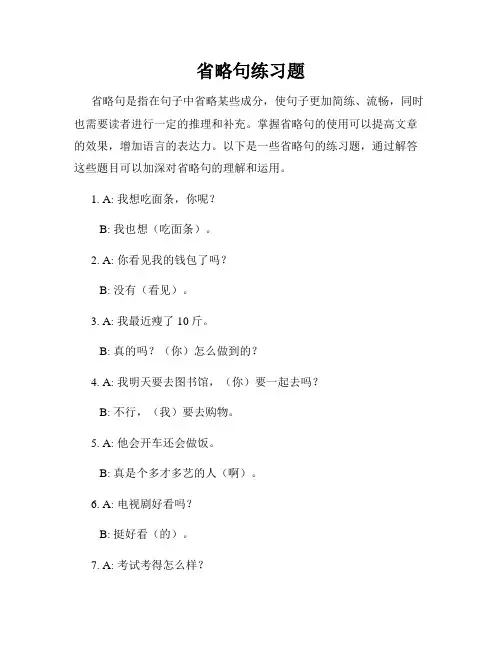
省略句练习题
省略句是指在句子中省略某些成分,使句子更加简练、流畅,同时也需要读者进行一定的推理和补充。
掌握省略句的使用可以提高文章的效果,增加语言的表达力。
以下是一些省略句的练习题,通过解答这些题目可以加深对省略句的理解和运用。
1. A: 我想吃面条,你呢?
B: 我也想(吃面条)。
2. A: 你看见我的钱包了吗?
B: 没有(看见)。
3. A: 我最近瘦了10斤。
B: 真的吗?(你)怎么做到的?
4. A: 我明天要去图书馆,(你)要一起去吗?
B: 不行,(我)要去购物。
5. A: 他会开车还会做饭。
B: 真是个多才多艺的人(啊)。
6. A: 电视剧好看吗?
B: 挺好看(的)。
7. A: 考试考得怎么样?
B: 考得不错(啊)。
8. A: 今天的天气好热啊。
B: 是啊,(真)让人受不了(啊)。
9. A: 请你帮我拿杯水好吗?
B: 可以(的)。
10. A: 我不喜欢吃肉。
B: 我也(不喜欢吃肉)。
以上是关于省略句的练习题,通过这些简单的对话句子可以深入理解和掌握省略句的用法。
在实际写作中,我们也可以灵活地运用省略句,简练而不失完整的句子能够提高文章的可读性和表达力。
所以,多加练习,不断熟悉和运用省略句的正确方式,将会对我们的写作水平有所提高。
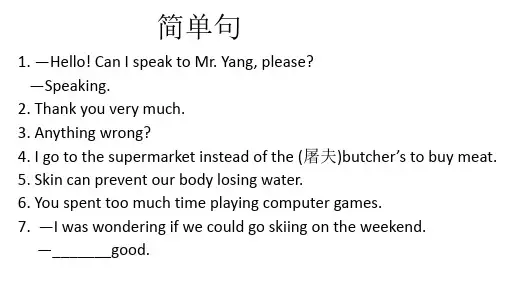
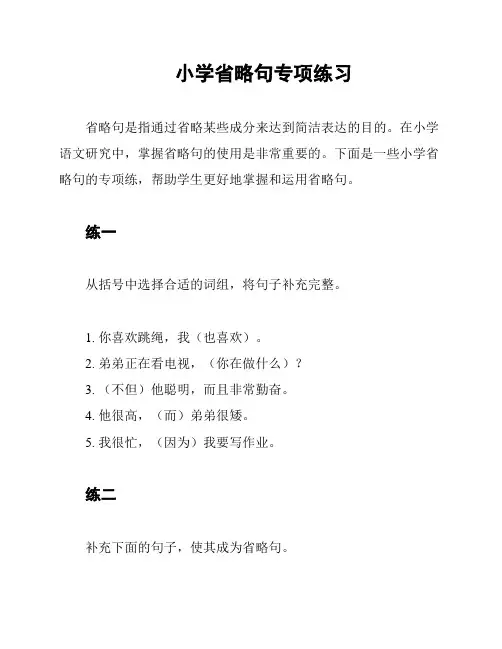
小学省略句专项练习
省略句是指通过省略某些成分来达到简洁表达的目的。
在小学语文研究中,掌握省略句的使用是非常重要的。
下面是一些小学省略句的专项练,帮助学生更好地掌握和运用省略句。
练一
从括号中选择合适的词组,将句子补充完整。
1. 你喜欢跳绳,我(也喜欢)。
2. 弟弟正在看电视,(你在做什么)?
3. (不但)他聪明,而且非常勤奋。
4. 他很高,(而)弟弟很矮。
5. 我很忙,(因为)我要写作业。
练二
补充下面的句子,使其成为省略句。
1. 他爱跑步,(你呢)?
2. 弟弟喜欢吃苹果,(姐姐呢)?
3. 他是个优秀的学生,(我们都知道)。
4. 爸爸很高,(妈妈也很高)。
5. 他很聪明,(这是大家都知道的)。
练三
根据上下文,补充省略句。
1. A: 你喜欢看书吗? B: (喜欢)。
2. A: 你会游泳吗? B: (会)。
3. A: 你的弟弟多大了? B: (三岁)。
4. A: 明天是周末,要去哪里玩吗? B: (不去)。
练四
根据提示,改写下面的句子为省略句。
1. 弟弟爱吃苹果。
- 弟弟()苹果。
2. 姐姐喜欢唱歌。
- 姐姐()唱歌。
3. 我们正在做作业。
- 我们()作业。
以上是小学省略句的专项练习,希望能帮助大家更好地理解和运用省略句的知识。
请大家积极参与练习,提升自己的语文水平!。
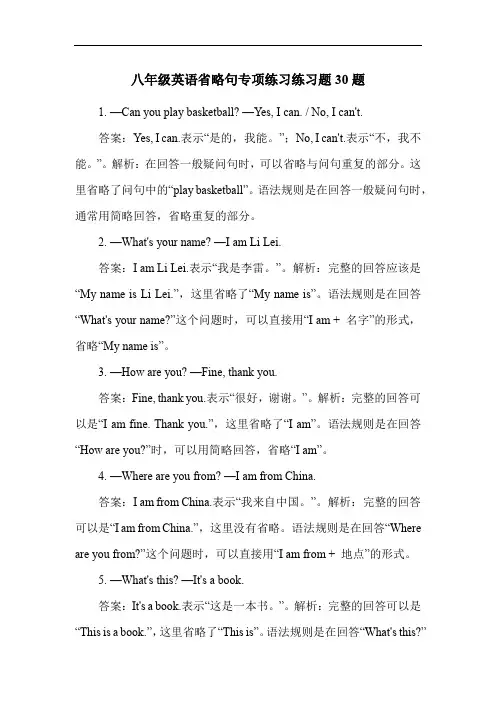
八年级英语省略句专项练习练习题30题1. —Can you play basketball? —Yes, I can. / No, I can't.答案:Yes, I can.表示“是的,我能。
”;No, I can't.表示“不,我不能。
”。
解析:在回答一般疑问句时,可以省略与问句重复的部分。
这里省略了问句中的“play basketball”。
语法规则是在回答一般疑问句时,通常用简略回答,省略重复的部分。
2. —What's your name? —I am Li Lei.答案:I am Li Lei.表示“我是李雷。
”。
解析:完整的回答应该是“My name is Li Lei.”,这里省略了“My name is”。
语法规则是在回答“What's your name?”这个问题时,可以直接用“I am + 名字”的形式,省略“My name is”。
3. —How are you? —Fine, thank you.答案:Fine, thank you.表示“很好,谢谢。
”。
解析:完整的回答可以是“I am fine. Thank you.”,这里省略了“I am”。
语法规则是在回答“How are you?”时,可以用简略回答,省略“I am”。
4. —Where are you from? —I am from China.答案:I am from China.表示“我来自中国。
”。
解析:完整的回答可以是“I am from China.”,这里没有省略。
语法规则是在回答“Where are you from?”这个问题时,可以直接用“I am from + 地点”的形式。
5. —What's this? —It's a book.答案:It's a book.表示“这是一本书。
”。
解析:完整的回答可以是“This is a book.”,这里省略了“This is”。
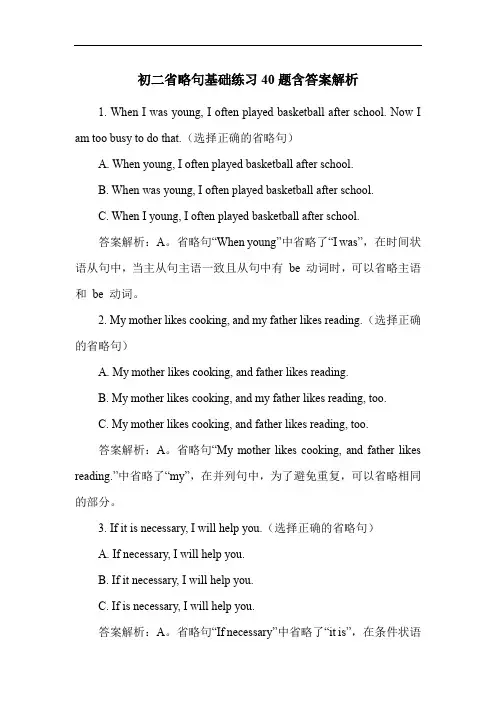
初二省略句基础练习40题含答案解析1. When I was young, I often played basketball after school. Now I am too busy to do that.(选择正确的省略句)A. When young, I often played basketball after school.B. When was young, I often played basketball after school.C. When I young, I often played basketball after school.答案解析:A。
省略句“When young”中省略了“I was”,在时间状语从句中,当主从句主语一致且从句中有be 动词时,可以省略主语和be 动词。
2. My mother likes cooking, and my father likes reading.(选择正确的省略句)A. My mother likes cooking, and father likes reading.B. My mother likes cooking, and my father likes reading, too.C. My mother likes cooking, and father likes reading, too.答案解析:A。
省略句“My mother likes cooking, and father likes reading.”中省略了“my”,在并列句中,为了避免重复,可以省略相同的部分。
3. If it is necessary, I will help you.(选择正确的省略句)A. If necessary, I will help you.B. If it necessary, I will help you.C. If is necessary, I will help you.答案解析:A。
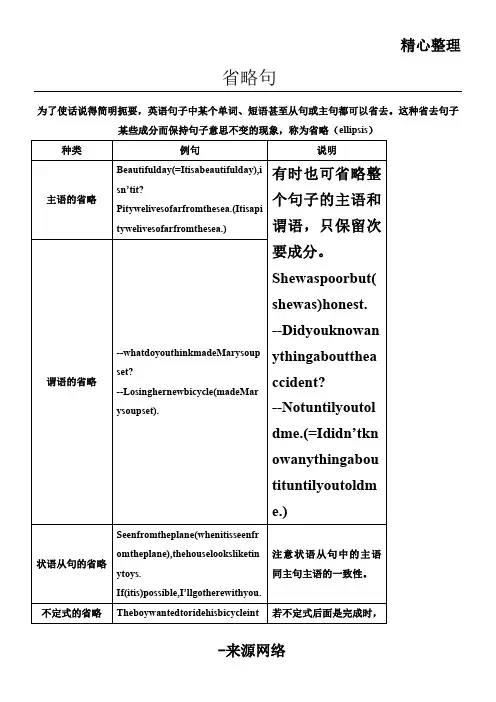
精心整理省略句为了使话说得简明扼要,英语句子中某个单词、短语甚至从句或主句都可以省去。
这种省去句子某些成分而保持句子意思不变的现象,称为省略(ellipsis)4、asif,asthough引导的方式状语从句e.g.Herubbedhiseyesandyawnedasif/though(hewas)wakingupafteralongsleep.Hestoodupasif/though(hewanted)toleave.(asif/though+todo表示一个将来的动作)1.Don'ttalkwhen/while()eating.2.When/While()inParis,shepickedupalotofFrench.3.Hehadanaccidentwhile()onhiswayhome.4.When/While()waitingthebus,hewasreadinganewspaper.5.When()askedwhyhewaslate,hesaidhemissedtheearlybus.6.When/While()stillaboy,hebegantosupporthimself.7.Ican'tdoituntil()toldhow.8.Sheissoshythatsheneverspeaksfirstuntil()spokento.9.If()operatedbycomputerinthefuture,manyofthetrains果有必要),ifpossible,whennecessary,ifany(如果有),wheneverpossible.练习:1.Whenfirst______tothemarket,thekindofproductdidn’tattractmuchattention.A.introducedB.introducingC.wasintroducedD.beingintroduced现就把各种状语从句的省略现象列举如下:一、时间状语从句中的省略When(shewas)veryyoung,shebegantolearntoplaythepiano.While(Iwas)atcollege,Ibegantoknowhim,astrangebutablestudent.Whenarriving,sendmeatelegram.(Whenyouarrive,sendmeatelegram.)Beforeleaving,turnoff allthelights.(Beforeyouleave,turnoffallthelights.)Don’tcomeinuntil(youare)askedto.Whenever(itis)possible,youshouldcomeandhelp.Youshouldletusknowtheresultassoonas(itis)possible.你应尽快让我们知道结果。
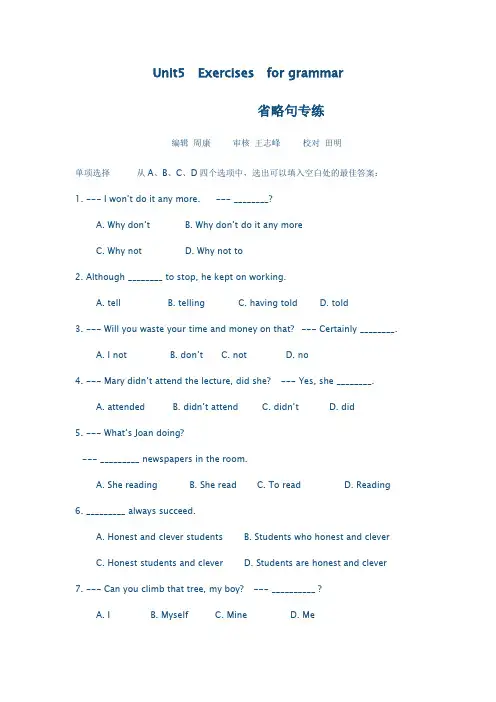
Unit5 Exercises for grammar省略句专练编辑周康审核王志峰校对田明单项选择从A、B、C、D四个选项中,选出可以填入空白处的最佳答案:1. --- I won’t do it any more.--- ________?A. Why don’tB. Why don’t do it any moreC. Why notD. Why not to2. Although ________ to stop, he kept on working.A. tellB. tellingC. having toldD. told3. --- Will you waste your time and money on that? --- Certainly ________.A. I notB. don’tC. notD. no4. --- Mary didn’t attend the lecture, did she?--- Yes, she ________.A. attendedB. didn’t attendC. didn’tD. did5. --- What’s Joan doing?--- _________ newspapers in the room.A. She readingB. She readC. To readD. Reading6. _________ always succeed.A. Honest and clever studentsB. Students who honest and cleverC. Honest students and cleverD. Students are honest and clever7. --- Can you climb that tree, my boy? --- __________ ?A. IB. MyselfC. MineD. Me8. Some people are against the plan but _______ support it.A. any moreB. many moreC. much moreD. no more9. --- I’ll be away on a business trip. Would you mind looking after my cat?--- Not at all. _________.A. I’ve no timeB. I’d rather notC. I’d like toD. I’d be happy to10. --- Why not go and have dinner in a restaurant? --- _________. It’s too expensive.A. Why notB. I agreeC. I’m afraid notD. I’m sure11.Tom wanted to play football with his friends in the street, but his father told him_____. A.not to B.not to do C.not do it D.do not to12.—Do you think Jack is going to watch a football match this weekend?—_____.A.I believe not B.I believe not soC.I don’t believe it D.I don't believe13.—What do you think made the girl so glad?—_____a beautiful necklace.A.As she received B.ReceivingC.Received D.Because of receiving14. Father advised me not to say anything until_____at the meeting.A.asking B.to ask C.asked D.ask 15.—Have you watered the flowers?—No, but_____.A.I am B.I’mm going C.I’m just going to D.I will go16. —He hasn’t gone to the office up to now.—Well, he_____.A.should B.ought to C.ought to go D.ought to have17.—The war is very likely to break out in the near future.—I_____.if the situation goes as it is.A.hope so B.hope not C.am afraid not D.am afraid so18.—You ought to have given them some advice.—_____, but who cared what I said?A.So ought you B.So I ought C.So I did D.So did you19. The man we followed suddenly stopped and looked as if_____.whether he was going in the right direction.A.seeing B.having seen C.to see D.to have sen20. _____.he come, the problem would be settled.A.Would B.Should C.Shall D.If21.—Can I see you at 3:00 pm next Monday?—I_____. I well have flown to New York long before thsn.A.am afraid not B.am afraid soC.am afraid to D.am afraid not to22. —Is that a book on farming? If so, I want to borrow_____.—Yes, it is.A.this B.it C.one D.the one23. _____, I will help you with your work.A.If am possible B.If it possible C.If possible D.Possible24.—How are you getting on with your work?—Oh, I’m sorry. Things aren’t going so well as_____.A.plans B.planning C.planned D.to plan25.—Are you a volunteer now?—No, but I _____. I worked for the City Sports Meeting last year.A.used to B.used to be C.used to do D.was used to答案1-5 CDCDD 6-10 ADBDC 11-15 AABCC16-20 DDCCB 21-25 AACCB。
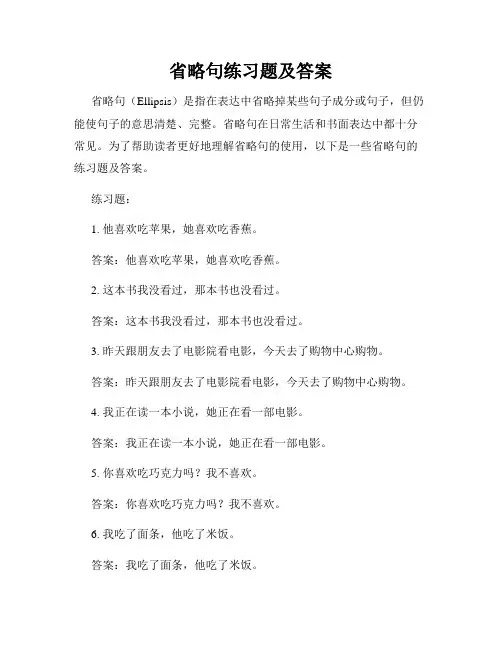
省略句练习题及答案省略句(Ellipsis)是指在表达中省略掉某些句子成分或句子,但仍能使句子的意思清楚、完整。
省略句在日常生活和书面表达中都十分常见。
为了帮助读者更好地理解省略句的使用,以下是一些省略句的练习题及答案。
练习题:1. 他喜欢吃苹果,她喜欢吃香蕉。
答案:他喜欢吃苹果,她喜欢吃香蕉。
2. 这本书我没看过,那本书也没看过。
答案:这本书我没看过,那本书也没看过。
3. 昨天跟朋友去了电影院看电影,今天去了购物中心购物。
答案:昨天跟朋友去了电影院看电影,今天去了购物中心购物。
4. 我正在读一本小说,她正在看一部电影。
答案:我正在读一本小说,她正在看一部电影。
5. 你喜欢吃巧克力吗?我不喜欢。
答案:你喜欢吃巧克力吗?我不喜欢。
6. 我吃了面条,他吃了米饭。
答案:我吃了面条,他吃了米饭。
7. 他喜欢在家看电视,我喜欢出去玩。
答案:他喜欢在家看电视,我喜欢出去玩。
8. 昨天我在图书馆看书,她在咖啡店喝咖啡。
答案:昨天我在图书馆看书,她在咖啡店喝咖啡。
9. 你想喝茶还是咖啡?我想喝咖啡。
答案:你想喝茶还是咖啡?我想喝咖啡。
10. 她是个医生,他是个律师。
答案:她是个医生,他是个律师。
答案解析:以上练习题中,答案部分都是省略掉了重复的句子或句子成分,以保持句意的完整和流畅。
在口语和书面表达中,为了避免重复,省略句是常用的表达方式。
需要注意的是,省略句的使用要在语境清晰、句意明确的前提下进行。
如果省略过度或造成歧义,会给读者带来困惑,影响信息的传达。
因此,在运用省略句时,要注意上下文的连贯性和语境的准确性。
总结:省略句作为一种常见的表达方式,能够简化语言,提高句子的简洁性和流畅性。
通过练习和实践,我们可以更加灵活地运用省略句,以达到更清晰、简洁的表达效果。
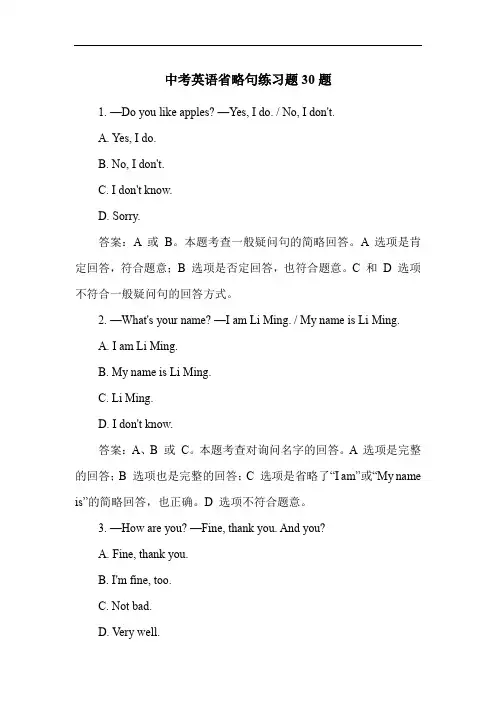
中考英语省略句练习题30题1. —Do you like apples? —Yes, I do. / No, I don't.A. Yes, I do.B. No, I don't.C. I don't know.D. Sorry.答案:A 或B。
本题考查一般疑问句的简略回答。
A 选项是肯定回答,符合题意;B 选项是否定回答,也符合题意。
C 和D 选项不符合一般疑问句的回答方式。
2. —What's your name? —I am Li Ming. / My name is Li Ming.A. I am Li Ming.B. My name is Li Ming.C. Li Ming.D. I don't know.答案:A、B 或C。
本题考查对询问名字的回答。
A 选项是完整的回答;B 选项也是完整的回答;C 选项是省略了“I am”或“My name is”的简略回答,也正确。
D 选项不符合题意。
3. —How are you? —Fine, thank you. And you?A. Fine, thank you.B. I'm fine, too.C. Not bad.D. Very well.答案:A、B、C 或D。
本题考查问候语“How are you?”的回答。
四个选项都是常见的回答方式,A 选项是完整的回答;B 选项是对“And you?”的回答;C 和D 选项也都是常见的简略回答。
4. —Nice to meet you! —Nice to meet you, too!A. Nice to meet you!B. Nice to meet you, too!C. Glad to see you!D. See you later!答案:B。
本题考查初次见面时的问候语的回应。
A 选项是问候语本身,不是回应;C 选项虽然也是问候语,但不是对“Nice to meet you!”的回应;D 选项是告别语。
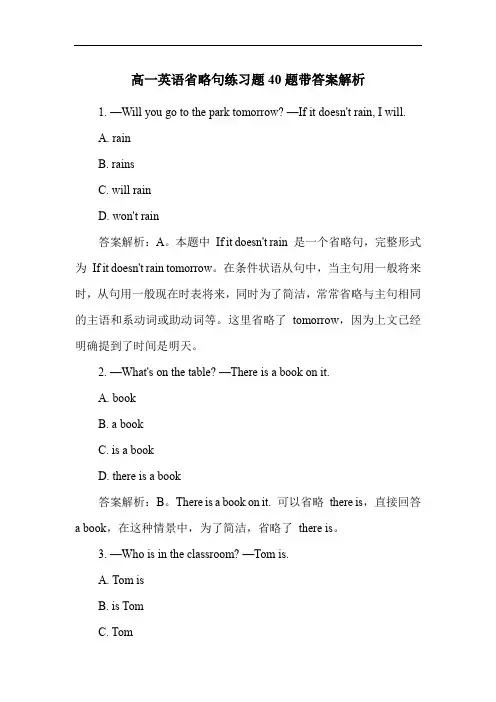
高一英语省略句练习题40题带答案解析1. —Will you go to the park tomorrow? —If it doesn't rain, I will.A. rainB. rainsC. will rainD. won't rain答案解析:A。
本题中If it doesn't rain 是一个省略句,完整形式为If it doesn't rain tomorrow。
在条件状语从句中,当主句用一般将来时,从句用一般现在时表将来,同时为了简洁,常常省略与主句相同的主语和系动词或助动词等。
这里省略了tomorrow,因为上文已经明确提到了时间是明天。
2. —What's on the table? —There is a book on it.A. bookB. a bookC. is a bookD. there is a book答案解析:B。
There is a book on it. 可以省略there is,直接回答a book,在这种情景中,为了简洁,省略了there is。
3. —Who is in the classroom? —Tom is.A. Tom isB. is TomC. TomD. there is Tom答案解析:A。
完整回答是Tom is in the classroom. 为了简洁,省略了in the classroom。
4. —Where is your pen? —It's in my bag.A. in my bagB. is in my bagC. it's in my bagD. there is in my bag答案解析:B。
完整回答是It is in my bag. 省略了主语it 和系动词is 之间的空格,为了更加简洁地表达。
5. —How are you? —Fine, thank you.A. FineB. I am fineC. am fineD. Fine, I am答案解析:B。
1. It is always difficult being in a foreign country, ________if you don't speak the language. (NMET2000)A. extremelyB. naturallyC. basicallyD. especially2. ________be sent to work there? (上海2002)A. Who do you suggestB. Who do you suggest that shouldC. Do you suggest who shouldD. Do you suggest whom should3. Two middle-aged passengers fell into the sea ,________, neither of them could swim.A. in factB. luckilyC. unfortunatelyD. naturally4. Never waste anything, and________, never waste time.A. after allB. at allC. in allD. above all5. His father came home at midnight, and ________, he was drunk.A. as a resultB. that is to sayC. what's moreD. sooner or later6. My sister speaks English_____, if not better than, my brother.A. as wellB. as well asC. so wellD. so well as7 _____, you have given me a lot of help.A Tell the truth B. To tell the truth C. Telling true D. Telling truth8. _____his face, the young man must be over 20.A. Judged fromB. JudgedC. Judging from D .Judging9. I don’t picking up your thing from the store ,____,the walk will do me good .A. sooner or laterB. stillC. in timeD. besides10. What he said,_____, has nothing to do with what he did.A. to my surprise B .to my surprised C. to my surprising D. to our surprises1.(09湖南卷)21. Every evening after dinner, if not from work, I will spend some time walking my dog.A. being tiredB. tiringC. tiredD. to be tired2.(09江西)35. Some of you may have finished unit one. _____ , you can go onto unit two. Ks5 A. If you may B. If you do C. If not D. If so3.(09山东卷) 32. ------shall we have our picnic tomorrow?-----______it doesn’t rain.A. UntilB. WhileC. OnceD. If4..(2008安徽卷,32)-----Have you got any particular plans for the coming holiday?----- Yes, _______, I’m going to visit some homes for the old in the city.A. If everB. If busyC. If anythingD. If possible5..(2008福建卷,30)– Who should be responsible for the accident?– The boss, not the workers. They just carried out the order _____.A. as toldB. as are toldC. as tellingD. as they told6.(2003年上海卷,39)Generally speaking , according to the directions , the drug has no side effect .A.when taking B.when taken C.when to take D.when to be taken7.(2004湖北卷,29)What surprised me was not what he said but_______he said it.A. the wayB. in the way thatC. in the wayD. the way which8.(2004江苏卷, 28). -- You haven't lost the ticket, have you?-- _________. I know it's not easy to get another one at the moment.A. I hope notB. Yes, I haveC. I hope soD. Yes, I’m afraid so9.(2005全国卷, 21)--–Can I speak to Mr Wang, please?--________.A. Who are you ?B. I’m WangC. SpeakingD. Are you Zhang10.(2005重庆, 27)__________, he talks a lot about his favorite singers after class.A. A quiet student as he may beB. Quiet student as he may beC. Be a quiet student as he mayD. Quiet as he may be a student11.(2005福建,33)When_______help, one often says “Thank you.” or “It’s kind of you”.A. offeringB. to offerC. to be offeredD. offered12.(2006年湖北,29)-- I was wondering if we could go skiing on the weekend.-- _______good.A. SoundB. SoundedC. SoundingD. Sounds13.(2006年湖北,31)__________ fired, your health care and other benefits will not be immediately cut off.A. Would you beB. Should you beC. Could you beD. Might you be。
高二英语省略句的常见形式练习题40题1._____ happy to help you whenever you need.A.I amB.Am IC.BeingD.Be答案:A。
本题考查省略句。
完整句子为“I am happy to help you whenever you need.”在这个句子中,“I am”在特定语境下可以省略“I”,只留下“am”,但在本题中,需要完整的主语“I am”。
选项B“Am I”是疑问句语序,不符合题意。
选项C“Being”和选项D“Be”单独使用时语法错误。
2._____ sorry for being late.A.I amB.Am IC.Me beD.Be I答案:A。
完整句子是“I am sorry for being late.”这里不能省略主语“I”,选项B“Am I”是疑问句语序,不符合。
选项C“Me be”语法错误,“me”不能作主语。
选项D“Be I”也不符合语法规则。
3._____ excited about the trip.A.She isB.Is sheD.Be she答案:A。
完整表达为“She is excited about the trip.”不能省略主语“she”,选项B 是疑问句语序,不对。
选项C“Her be”错误,“her”不能作主语。
选项D“Be she”也不对。
4._____ worried about the exam.A.He isB.Is heC.Him beD.Be he答案:A。
“He is worried about the exam.”不能省略主语“he”,选项B 疑问句语序错误,选项C“him”不能作主语,选项D“Be he”错误。
5._____ surprised to see you here.A.We areB.Are we beD.Be we答案:A。
完整句子是“We are surprised to see you here.”不能省略主语“we”,选项 B 是疑问句语序,选项C“us”不能作主语,选项D“Be we”错误。
中考英语省略句顶级综合练习题30题含答案解析1. —Will you come to the party?—If I am invited, I ____ come.A.mayB.mustC.canD.should答案解析:A。
本题考查省略句。
完整的句子应该是If I am invited, I may come to the party. “may”表示可能性,“must”表示必须,语气过于强硬;“can”表示能够,在这里不太符合语境;“should”表示应该,也不太恰当。
2. —Do you think he will win?—Hard to say. But if he tries his best, he ____ succeed.A.mightB.mustC.shouldD.need答案解析:A。
完整的句子是If he tries his best, he might succeed. “might”表示可能性较小;“must”表示一定,语气太绝对;“should”表示应该;“need”表示需要,在这里不合适。
3. —Will it rain tomorrow?—If it rains, we ____ stay at home.A.willB.mustC.canD.should答案解析:A。
完整句子是If it rains, we will stay at home. 这是一个条件状语从句,遵循主将从现原则,所以用“will”;“must”必须;“can”能够;“should”应该,都不符合。
4. —Can you go shopping with me?—If I have time, I ____ go with you.A.mayB.mustC.canD.should答案解析:A。
完整句子是If I have time, I may go shopping with you. “may”表示可能性;“must”必须,太绝对;“can”能够,不太符合语境;“should”应该,不合适。
省略句练习与答案A1. -What’s the matter with John?-He didn’t pass the test but he still____.A. hopes soB. hopes toC. hopes itD. hopes that某些表示心理或情感状态的动词如:love, mean, want, hate, like, prefer, wish, expect, hope等的后面跟不定式时,为避免重复,常省略与上文相同的动词,而只保留不定式符号to。
2. -She must look like a very pretty girl. -Yes, I imagine__________. A. to B. that C. it D. soso 和not可放在动词expect,fear,hope,suppose,believe,think,imagine以及词组be afraid等的后面,省略与上文相同的肯定或否定的宾语从句。
3. This is an illness that can result in total blindness_______ left untreated. A. after B. if C. since D. unless 在带有状语从句的复合句中,如果从句与主句的主语一致,且从句中含有be动词,则可以省略从句的主语及be动词。
此处从句中省略了it is。
4. -What will John Smith be doing in the fall of this year? -_________ mathematics at a high school.A. TeachingB. To teachC. Be teachingD. Teac回答what的问句,省去了He will be。
5. -Better not have the operation right now. -______. A. I mustn’t B. I shouldn’t C.I won’t D. I can’t6. -Will you go to the party? -Of course I will if_________.A. I was invitedB. invitedC. having invitedD. I will be invited本题省去了I am。
高一英语省略句运用单选题30题1. —Do you think it will rain tomorrow?—I hope not. If it rains, we'll have to stay at home.The underlined sentence is an example of elliptical sentence. Which of the following is the full sentence?A. If it rains tomorrow, we'll have to stay at home tomorrow.B. If it will rain tomorrow, we'll have to stay at home.C. If it rains tomorrow, we'll have to stay at home.D. If it rained tomorrow, we'll have to stay at home.答案:C。
解析:在这个省略句中,if 引导的条件状语从句中,时间状语tomorrow 在主句中出现过,所以在从句中可以省略。
A 选项重复了tomorrow;B 选项中if 引导的条件状语从句中不能用will rain;D 选项时态错误。
2. —Will you go to the party tonight?—I'm not sure. If I have time, I'll go.The underlined sentence is an example of elliptical sentence. Which of the following is the full sentence?A. If I have time tonight, I'll go to the party tonight.B. If I have time, I'll go to the party.C. If I had time, I'll go to the party.D. If I had time tonight, I'll go to the party tonight.答案:B。
中考英语省略句练习题30题1. —Will you come to the party tomorrow?—If I am invited, I will come.A. If I am invited, I will come.B. If invited, I will come.C. If I am invited.D. If invited.答案:B。
解析:选项 A 是完整的条件状语从句,选项B 是省略句,省略了I am,在条件状语从句中,当主从句主语一致且从句中有be 动词时,可以省略主语和be 动词。
选项C 和D 缺少主句。
2. —What should I do if I am in trouble?—You can ask your teacher for help.A. You can ask your teacher for help.B. Ask your teacher for help.C. If you are in trouble, ask your teacher for help.D. When you are in trouble, ask your teacher for help.答案:B。
解析:选项 A 是完整的回答,选项B 是省略句,省略了If you are in trouble,在表示建议的句子中,可以省略条件状语从句中的部分内容。
选项C 和D 虽然意思正确,但不是省略句。
3. —I am sorry I can't go with you.—It doesn't matter.A. It doesn't matter.B. If you can't go with me, it doesn't matter.C. Because you can't go with me, it doesn't matter.D. When you can't go with me, it doesn't matter.答案:A。
省略句+练习省略句为了使话说得简明扼要,英语句子中某个单词、短语甚至从句或主句都可以省去。
这种省去句子某些成分而保持句子意思不变的现象,称为省略(ellipsis)Ⅰ、状语从句中的省略用法一、如果从句的主语和主句的主语一致,且从句的谓语含有be动词的某种形式(am/is/are/was/were),可同时省略从句的主语和be动词的某种形式。
1、when,while,till,untill, once所引导的时间状语从句e.g. Do be careful when (you are) crossing the street.When/While (I was) on my way to work, I met her.2、if,unless,once引导的条件状语从句e.g. If (it is) properly treated, waste will do no harm to the environment.I’ll not go to the party unless (I am) invited.Once (you are) caught stealing in a supermarket, you will be punished.3、though,although,whether,no matter whether/what/how/who等引导的让步状语从句e.g. He was happy, though/although (he was) poor.Whether (she is) sick or well, she is always cheerful.No matter how/However hard the task (is), we must fulfill it in time.(注:从句的主语和主句的主语不一致时,只省略从句中的be动词形式)4、as if,as though引导的方式状语从句e.g. He rubbed his eyes and yawned as if/though (he was) waking upafter a long sleep.He stood up as if/though (he wanted) to leave.(as if/though + to do表示一个将来的动作)1. Don't talk when/while ( ) eating .2.When/While ( ) in Paris , she picked up a lot of French .3.He had an accident while ( ) on his way home .4.When/While ( ) waiting the bus , he was reading anewspaper.5.When ( ) asked why he was late , he said he missed the earlybus .6.When/While ( ) still a boy , he began to support himself .7. I can't do it until ( ) told how .8. She is so shy that she never speaks first until ( ) spoken to .9. If ( ) operated by computer in the future , many of the trainswill have no drivers .10. If ( )heated to a higher temperature , water will be turned intosteam .11.Unless ( ) invited , I won't go .12.Once ( ) seen , it will never be forgotten .13.Though ( ) young , he knows a lot .14. Even if / Even though ( ) invited , he won't go .15. They looked around the room as if ( they were ) looking forsomething .16. He opened his mouth as if (he was ) to say something .17.If (it is) possible / necessary , he'll go there .18.The boys will go out to play football whenever ( it is ) possible .19.He is much taller than ( he is ) expected .20.When __ , the museum will open to the public next year .pleted.pletingC.being completedD. to be completed21.The flowers his friend gave him will die unless _______every day.A.wateredB. wateringC. waterD. to water注:1.before与after作为介词后可以跟名词或动名词。
2.连词+ 形容词/其它如:if so(如果如此), if necessary(如果有必要),if possible,when necessary,if any(如果有) , whenever possible.练习:1.When first ______ to the market , the kind of product didn’t attract much attention.A. introducedB. introducingC. was introducedD. being introduced现就把各种状语从句的省略现象列举如下:一、时间状语从句中的省略When (she was) very young, she began to learn to play the piano.While (I was) at college, I began to know him, a strange but able student.When arriving, send me a telegram. (When you arrive, send me a telegram.) Before leaving, turn off all the lights. (Before you leave, turn off all the lights.)Don’t come in until (you are) asked to.Whenever (it is )possible, you should come and help.You should let us know the result as soon as(it is) possible.你应尽快让我们知道结果。
注:as在引导时间状语从句时,没有这种省略现象。
我们不可说As walking, she found a nice shining thing on the ground.二、地点状语从句中的省略地点状语从句的省略常用下列结构:where(ver) possible, where(ver) necessary,Lay these books where possible you can find them easily.把这些书放在你可能容易找到的地方。
Put in articles wherever necessary in the following passages.在下列文章中需要的地方填入冠词。
三、条件状语从句中的省略常用的句型是:if necessary, if possible, if true, if anyone等。
如:Send the goods now if (they are) ready. 货物如果准备好了,请送过来。
He will come if (he is) asked. 如果叫他来,他就来。
If (it is) necessary, ring me at home. 如果有可能,朝我家里打电话。
Come along with me if (it is) possible. 如果有可能和我一起去吧.。
If (it is) true, this will casue us a lot of trouble.There are few people nowadays, if (there are) any, who remember him.You should stay where you are, unless (you are) asked to leave.四、让步状语从句中的省略He is a good man, though sometimes (he is) rather dull.Even if (I am ) invited to, I won’t go to such a bad lecture.五、比较状语从句中的省略She can play the piano just as wonderfully as you (do).她钢琴弹的我你弹的一样好。
She has finished the work earlier than (it has been ) expected.她这项工作比预料的提前完成。
六、方式状语从句中的省略as if/as though后还可加n./a./ad./介词短语/现在分词/过去分词/不定式。
He acts as if (he were) a fool. 他的行为举止好象是个傻子。
She talked to the stranger as if (she were) absent-minded.她和陌生人谈话似乎很不在意。
He opened the desk, as if (he was) in search of something important.他打抽屉仿佛要找一件什么重要的东西。
The boy is running impatiently here and there as if (he is) searching for somethinglost on the sports ground.The football player is rolling on the ground as if (he is) hurt badly in the leg.He moved his lips as if (he wanted )to speak. 他的嘴动着仿佛要说什么二、than,as引导的比较状语从句中的省略用法:当不同的主语进行比较时,一般省略从句中的谓语;当从句中的主语与谓语(be动词除外)和主句中的主语与谓语相同时,通常省略从句中的主语和谓语,只保留比较部分。